Imagine you’re traveling on a camel at the foot of the pyramids in Egypt when the camel handler suddenly rattles off a sentence in Egyptian Arabic. You glance at the camel, hoping for some kind of translation, but all you get is a slow, deliberate chew. Awkward, right? 🙂
But don’t worry! With just a few useful words and phrases, you’ll not only understand what’s going on around you but also impress the locals – not to mention the camel. Let’s dive in before the camel loses its patience! 🙂
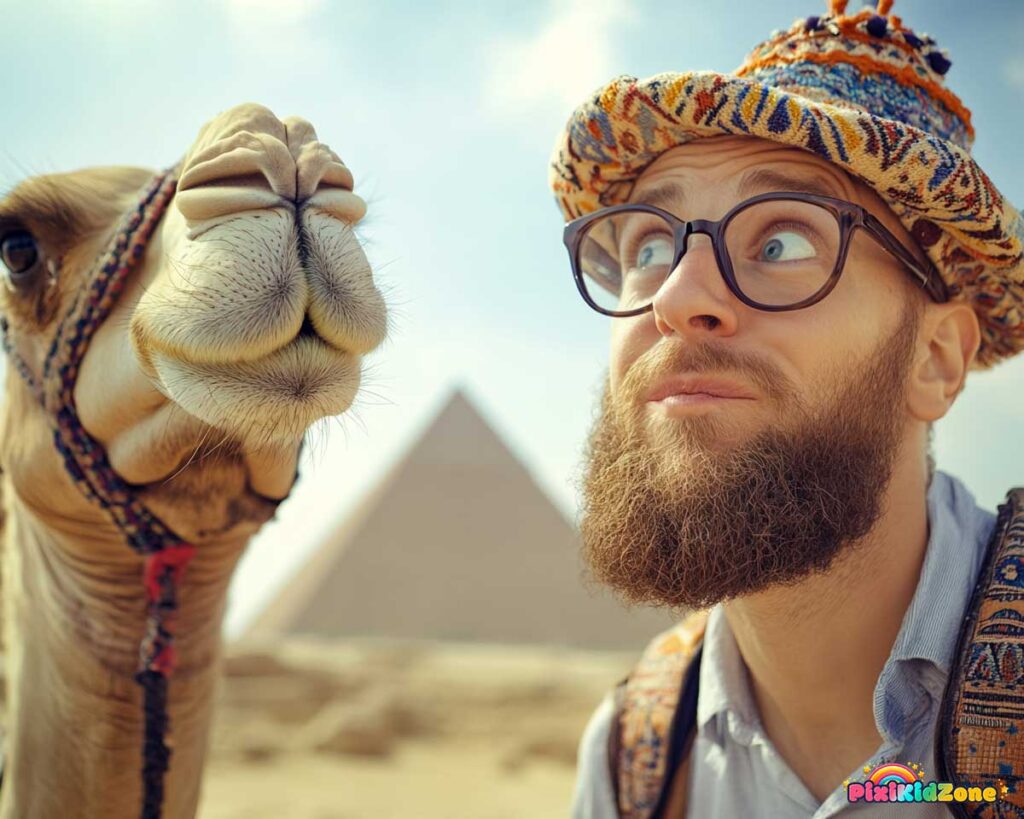
If you want to deepen your knowledge of Arabic, try the PixiLearn Arabic learning app, where you can learn Arabic words and phrases in a fun and interactive way. Download it now and start learning! Learn Arabic words with PixiLearn
Egyptian Arabic – How It Became the Language of Everyday Life
In Egypt, the official language is Modern Standard Arabic, which you’ll find in news broadcasts, government offices, and textbooks – but using it in everyday life is like trying to order a pizza in Shakespearean English. The real star of the show is Egyptian Arabic, a language bursting with colorful expressions, shortcuts, and slang that even camels might understand (and trust me, they know everything).
So, why do they speak Arabic? The language arrived in Egypt in the 7th century with the Islamic conquests. Before that, Ancient Egyptian, and later its descendant, Coptic, were the dominant languages. Today, Coptic survives only as a liturgical language used by the Coptic Christian community. But the Egyptians didn’t just stick with Arabic as it came – they spiced it up with their own unique style, added a pinch of Ancient Egyptian heritage, and sprinkled in some French and English influences. Why not, right?
If you want to understand what’s happening around you in Egypt – whether it’s a merchant bargaining in a bazaar, a waiter in a café, or a guide wandering around the pyramids – knowing a few Egyptian Arabic words and phrases is worth its weight in gold. Now, let’s dive into those essential words, expressions, and slang that will not only help you get by but also put a smile on the locals’ faces! 🙂
Understanding Gender in the Egyptian Language: When the Speaker or Listener’s Gender Matters
In Egyptian Arabic, the gender of the speaker and listener plays a key role in shaping how sentences are constructed. But don’t worry – the rules are simple, and with a little practice, you’ll pick them up in no time!
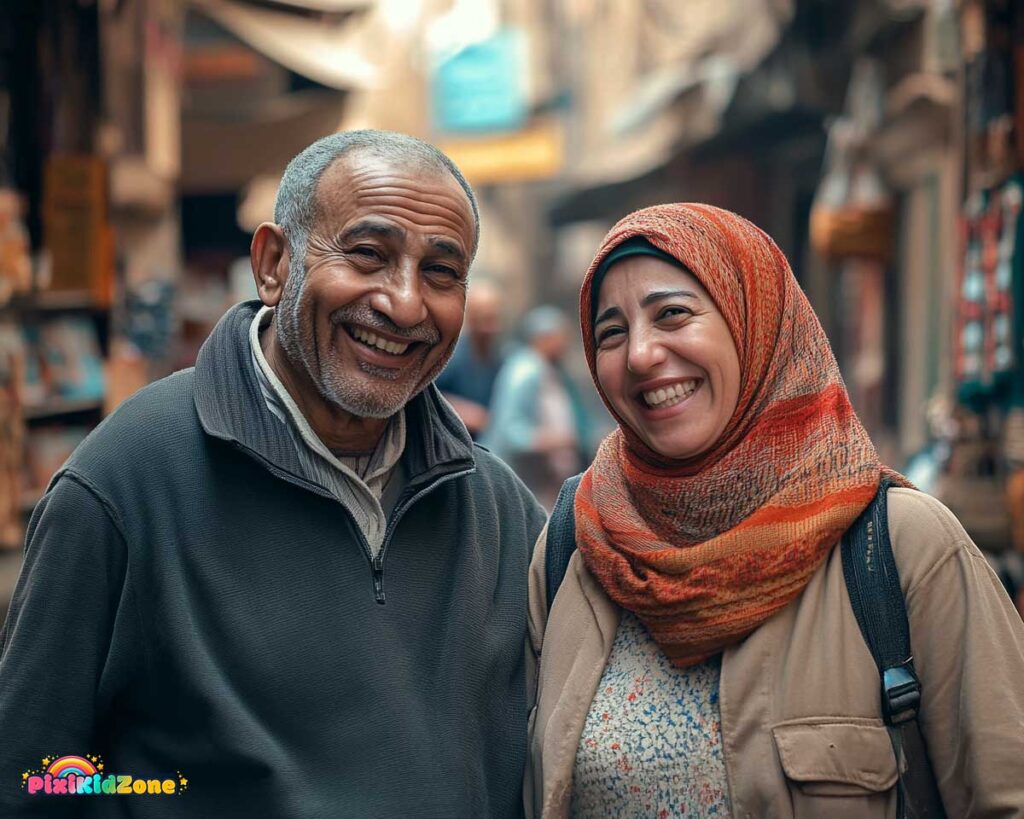
When Does the Speaker’s Gender Matter?
The speaker’s gender is important when you’re talking about yourself, like expressing what you want. Let’s take a common example: eating.
If a woman says it: “Ayza akol.” (عايزة أكل.) (I’d like to eat.)
If a man says it: “Aayiz akol.” (عايز أكل.)
Think of it as the language’s way of adding a personal touch to your sentences, almost like a built-in name tag.
When Does the Listener’s Gender Matter?
The listener’s gender comes into play when you’re asking a question or addressing someone. For instance, if you want to ask if someone is hungry:
If you’re speaking to a man: “Enta ga’an?” (إنت جعان؟) (Are you hungry?)
If you’re speaking to a woman: “Enti ga’ana?” (إنتي جعانة؟)
Here, getting the gender wrong might just make someone smile, but getting it right will definitely impress them!
A Quick Tip:
If you’re ever unsure, just smile and say: “Ana mish fahim(a).” (أنا مش فاهم(ة).) (I don’t understand.) – “Fahim” (فاهم) if you’re a man, and “Fahima” (فاهمة) if you’re a woman. This is a guaranteed icebreaker, and chances are, someone will help you right away! 😊
While the gender rules in Egyptian Arabic might seem tricky at first, they’re really just a fun detail that adds depth to the language. And when you use them correctly, you’ll definitely earn some respect from the locals! 😊
Greetings and Polite Expressions in Egyptian Arabic
Egyptian Arabic greetings are not just polite expressions but an integral part of the culture, often varying based on the context and relationship between people. In formal settings like offices or official meetings, phrases such as “Salam Alaikum” (Peace be upon you) or “Sabah el-kheir” (Good morning) are commonly used to convey respect. Among younger people, greetings are much more casual, often just “Salam!” or even a simple nod.
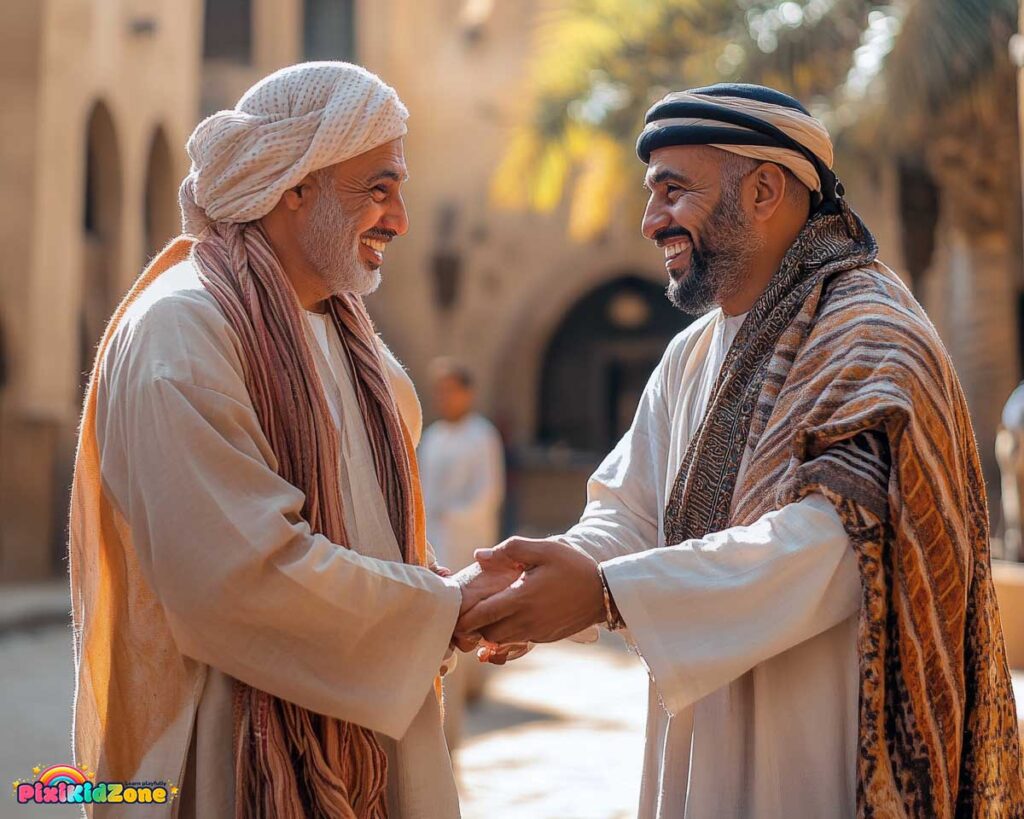
Elders, on the other hand, may engage in longer, more elaborate greeting rituals, reflecting a sense of tradition and mutual respect. When a younger person greets an elder, they are expected to use more formal and respectful expressions, acknowledging the elder’s status. These greetings not only foster friendliness and respect but also highlight the importance of social connections in Egyptian culture. 😊
“Salam Alaikum!” (السلام عليكم!)
– Peace be upon you!
(A formal and respectful greeting often used in official settings or when addressing elders.)
“Wa Alaikum Salam!” (وعليكم السلام!)
– And peace be upon you too!
(The traditional response to “Salam Alaikum,” reflecting respect and goodwill.)
“Salam!” (سلام!)
– Hello!
(The universal greeting that works in any situation.)
“Sabah el-kheir!” (صباح الخير!)
– Good morning!
(A polite way to greet someone at the start of the day.)
“Sabah el-noor!” (صباح النور!)
– Response to “Good morning!”
(Literally: Morning of light.)
“Masa’ el-kheir!” (مساء الخير!)
– Good evening!
(A greeting used after sunset.)
“Masa’ el-noor!” (مساء النور!)
– Response to “Good evening!”
(Literally: Evening of light.)
“Ezzayak?” (إزّيك؟)
– How are you? (to a man)
“Ezzayik?” (إزّيك؟)
– How are you? (to a woman)
“Kullu tamam?” (كله تمام؟)
– Is everything fine?
(A casual way to check in on someone.)
“Alhamdulillah.” (الحمد لله.)
– Praise be to God.
(The usual response to “How are you?”, meaning “I’m fine, thank God.”)
“Ashofak baden!” (أشوفك بعدين!)
– See you later! (to a man)
“Ashofik baden!” (أشوفك بعدين!)
– See you later! (to a woman)
“Ma’assalama!” (مع السلامة!)
– Goodbye!
(A polite way to say farewell.)
Egypt Words, Phrases, and Slang for Real-Life Situations
The World of Bazaars in Egypt
A trip to Egypt is incomplete without diving into the bustling energy of a real bazaar. Picture this: vibrant fabrics, the aroma of spices, sparkling lanterns, and a symphony of voices, as every vendor competes for your attention. A bazaar is both chaos and wonder – a place where you can discover something unique at every corner.
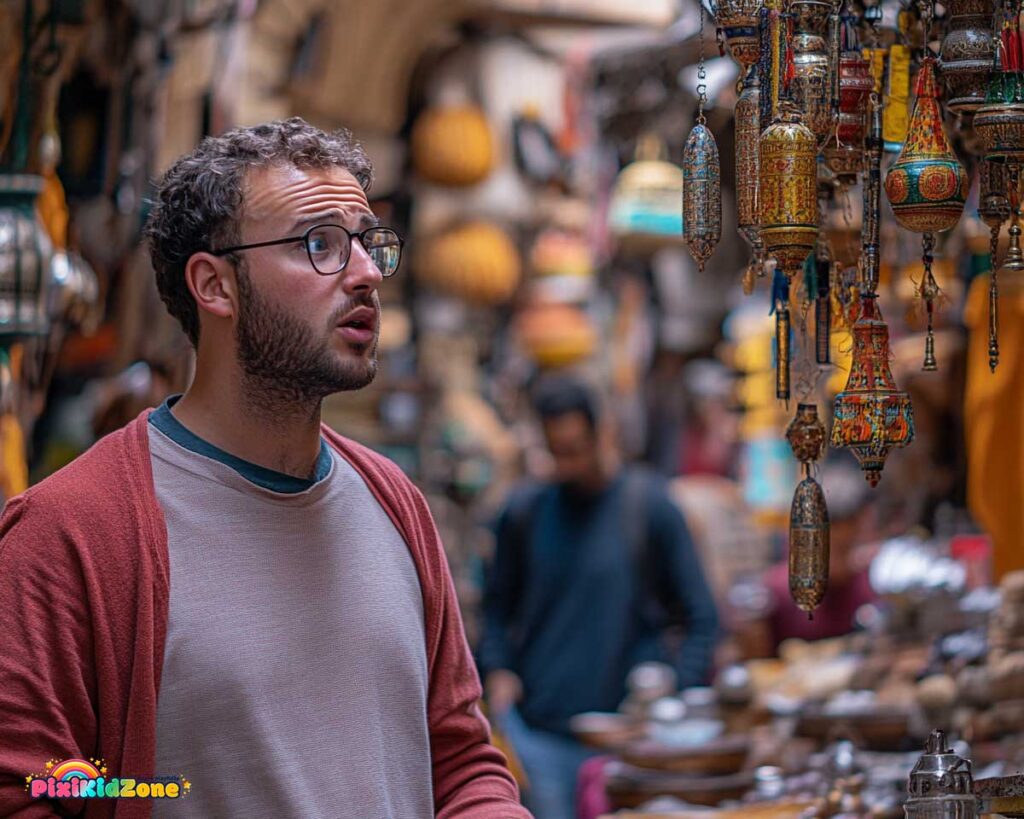
The most iconic bazaar is located in the heart of Cairo: Khan el-Khalili. With its centuries-old history, it’s like stepping back in time. Here, you’ll find everything from handcrafted jewelry to authentic Arabic coffee. The vendors are always friendly, but be prepared – nothing happens here without bargaining!
In a bazaar, you’re not just shopping; you’re immersing yourself in a cultural experience. The vendors often smile and offer you a cup of tea while entertaining you with colorful stories. But if you don’t understand Arabic, you might feel like you’ve landed on another planet.
And that’s exactly where a few essential Egyptian Arabic phrases come in handy. Imagine spotting a beautiful scarf, and the vendor greets you with a big smile, waiting for your question. What do you say? Let’s explore how you can navigate the vibrant world of Egyptian bazaars! 😊
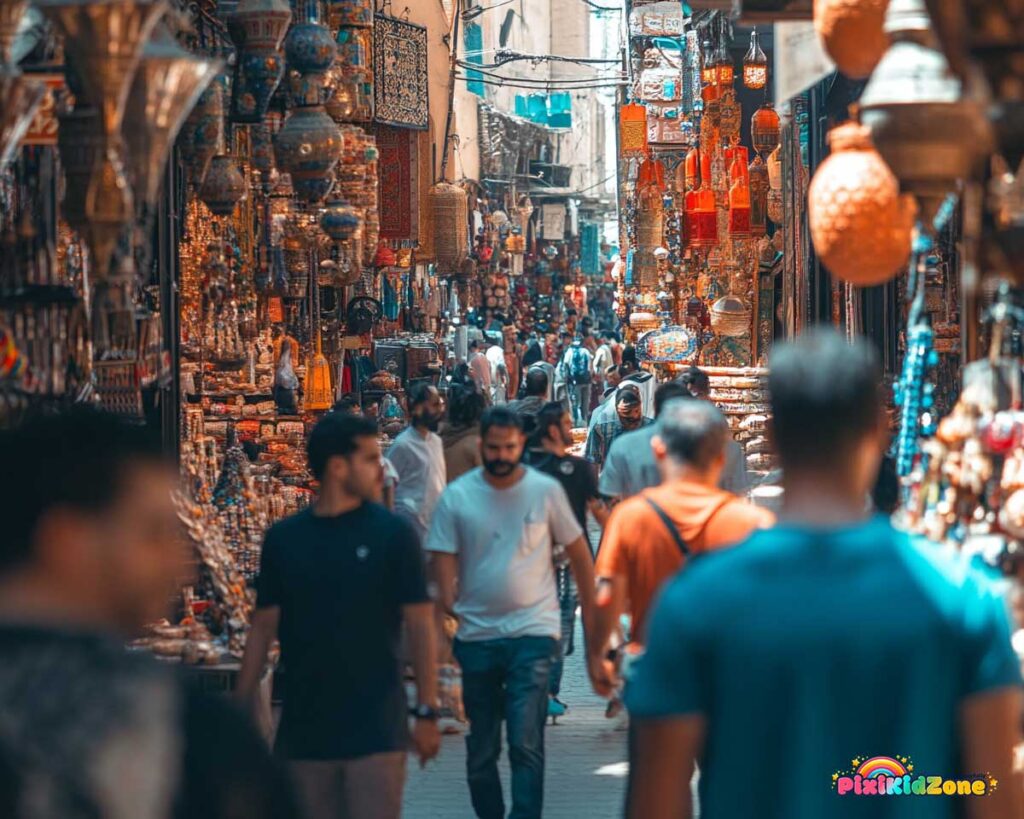
1. Bikam da?
(بكام ده؟)
– How much is this?
(Start your bargaining with this, and the vendor will surely respond with a smile.)
2. Ghalli awi!
(غالي أوي!)
– This is too expensive!
(A must-have phrase for bargaining – it shows you’re not accepting the first price.)
3. Mumkin tkhafed shwaya?
(ممكن تخفض شوية؟)
– Can you lower the price a little?
(A polite way to ask for a discount, which vendors respect.)
4. Ana mish mohtam.
(أنا مش مهتم.)
– I’m not interested.
(When someone is too persistent in trying to sell you something, this is a polite way to stop them.)
5. Ayza ashtari…
(عايزة أشتري…)
– I’d like to buy…
(Use this when you’re looking for something specific, like a scarf or lantern.)
If a woman says it:
If a man says it: Ayez ashtari… (عايز أشتري…)
6. Shukran!
(شكراً!)
– Thank you!
(This is the magic word you can use in any situation, whether you’re buying something or receiving help.)
7. Ma’assalama.
(مع السلامة.)
– Goodbye!
(A polite farewell that will be appreciated by everyone, whether it’s a vendor or a local helping you.)
8. Fayn al-kahwa?
(فين القهوة؟)
– Where can I find coffee?
(A much-needed phrase when walking around the bazaar and looking for a little energy boost.)
9. Ana mish fahim.
(أنا مش فاهم.)
– I don’t understand.
(Use this when the vendor is speaking too fast, and you need them to slow down.)
If a woman says it: Ana mish fahma. (أنا مش فاهمة.)
10. Kullu tamam!
(كله تمام!)
– Everything is fine!
(Use this to show that you’re okay and enjoying the experience – vendors will love it.)
Linguistic Survival Kit for Egyptian Cafés
Egyptian cafés, or ahwas, are not just places to grab a cup of coffee – they are vibrant hubs of social life, rich with history and tradition. Whether you’re in the bustling streets of Cairo or a quieter small town, stepping into a café is like stepping into the cultural heart of Egypt. Here, locals meet up with friends, play dominoes or board games, and, of course, sip on strong, aromatic coffee or sweet tea.
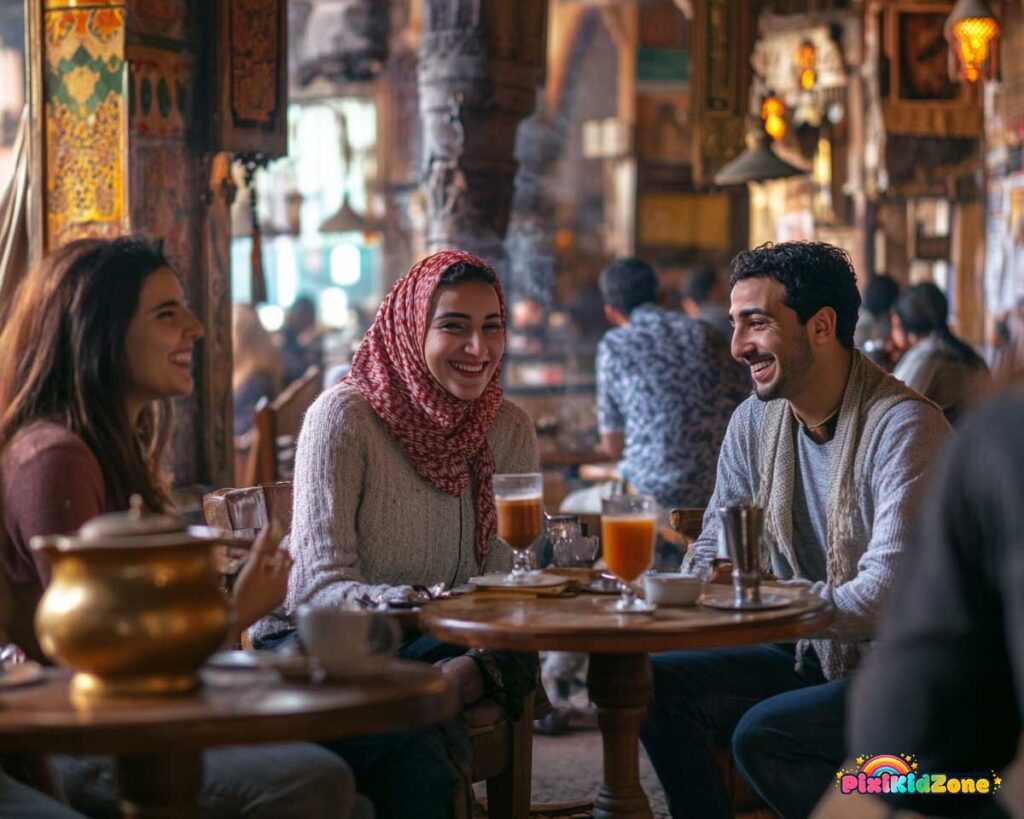
What to Expect in an Egyptian Café
- Ambiance: Most cafés exude a relaxed, traditional charm, with small tables, wooden chairs, and the warm aroma of freshly brewed coffee or shisha smoke filling the air.
- Coffee and Tea: Egyptian coffee is strong and intense, often brewed with sugar but without milk. If you order tea, expect it to arrive generously sweetened, often flavored with mint.
- Etiquette Tips: If you order shisha, always share it with friends – it’s part of the social experience. Drinks are never rushed here; coffee is meant to be savored slowly as part of a longer ritual.
Helpful Tips for Travelers
- Bargaining and Tipping: While most café prices are fixed, there are still places where bargaining might happen. Always leave a small tip as a polite gesture.
- Don’t Worry About the Language: A smile and a few Egyptian Arabic phrases can work wonders, even if your pronunciation isn’t perfect.
To truly feel at home in an Egyptian café and avoid simply smiling and nodding, it’s worth learning a few essential Egyptian Arabic phrases. Let’s see how you can navigate a café, order your coffee, and maybe even strike up a conversation! 😊
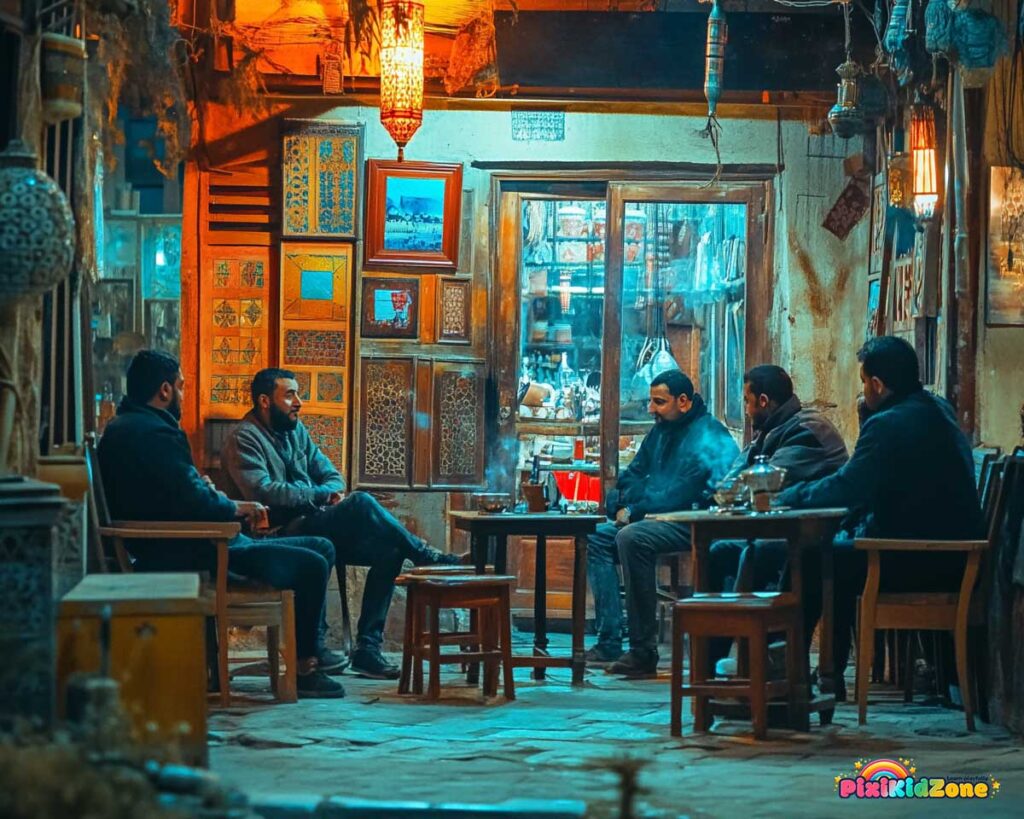
Can Women Visit Egyptian Cafés?
Yes, women can visit Egyptian cafés, but customs vary depending on the location and style. In modern cafés, especially in cities like Cairo and Alexandria, it’s completely normal for women to be present. However, in traditional ahwas, the crowd is predominantly male, and women are less common, particularly in rural areas. In more conservative settings, modest clothing is recommended to avoid unwanted attention.
1. Ana aayiz al-kahwa.
(أنا عايز القهوة.)
– I’d like a coffee.
(Perfect for ordering your favorite cup of coffee.)
If a woman says it: Ana ayza al-kahwa. (أنا عايزة القهوة.)
2. Mumkin shay?
(ممكن شاي؟)
– Can I have tea?
(A simple and polite way to ask for a cup of tea.)
3. Fayn al-hammam?
(فين الحمام؟)
– Where is the bathroom?
(An essential phrase for any café visit after enjoying that strong coffee.)
4. Ma’a sukkar?
(مع سكر؟)
– With sugar?
(Ask this if you prefer your coffee or tea sweetened.)
5. Ana mish aayiz sukkar.
(أنا مش عايز سكر.)
– I don’t want sugar.
*(If a woman says it: Ana mish ayza sukkar. (أنا مش عايزة سكر.))
(For those who prefer their drinks without sugar.)
*(If a woman says it: Ana mish ayza sukkar. (أنا مش عايزة سكر.))
6. Shukran! (شكراً!)
– Thank you!
(A magic word that is always appreciated by the café staff.)
7. Haseb law samaht.
(حاسب لو سمحت.)
– The check, please.
(Polite way to ask for the bill when you’re done.)
8. Mumkin al-kahwa masboot?
(ممكن قهوة مضبوط؟)
– Can I have medium-sweet coffee?
(Use this if you want your coffee perfectly balanced – not too sweet, not too bitter.)
9. Ayza shisha.
(عايزة شيشة.)
– I’d like a shisha. (If a woman says it)
If a man says it: Aayiz shisha. (عايز شيشة.))
(Great for ordering a traditional waterpipe.)
10. Kullu tamam.
(كله تمام.)
– Everything is fine.
(Use this to show you’re enjoying your experience in the café – it’s guaranteed to make the staff smile.)
Practical Egypt Language Words for Exploring the Pyramids
Visiting the pyramids is the highlight of any trip to Egypt and a once-in-a-lifetime experience. As the desert wind tousles your hair and the pyramids grow closer, you can almost hear ancient Egypt whispering to you. Or, perhaps, it’s just the camel braying in the background. The sight of these massive stone structures is awe-inspiring, but before you completely lose yourself in history, a few modern questions might pop into your mind: “Where can I buy tickets?”, “Where’s the bathroom?”, or the classic, “How did I even end up here?”
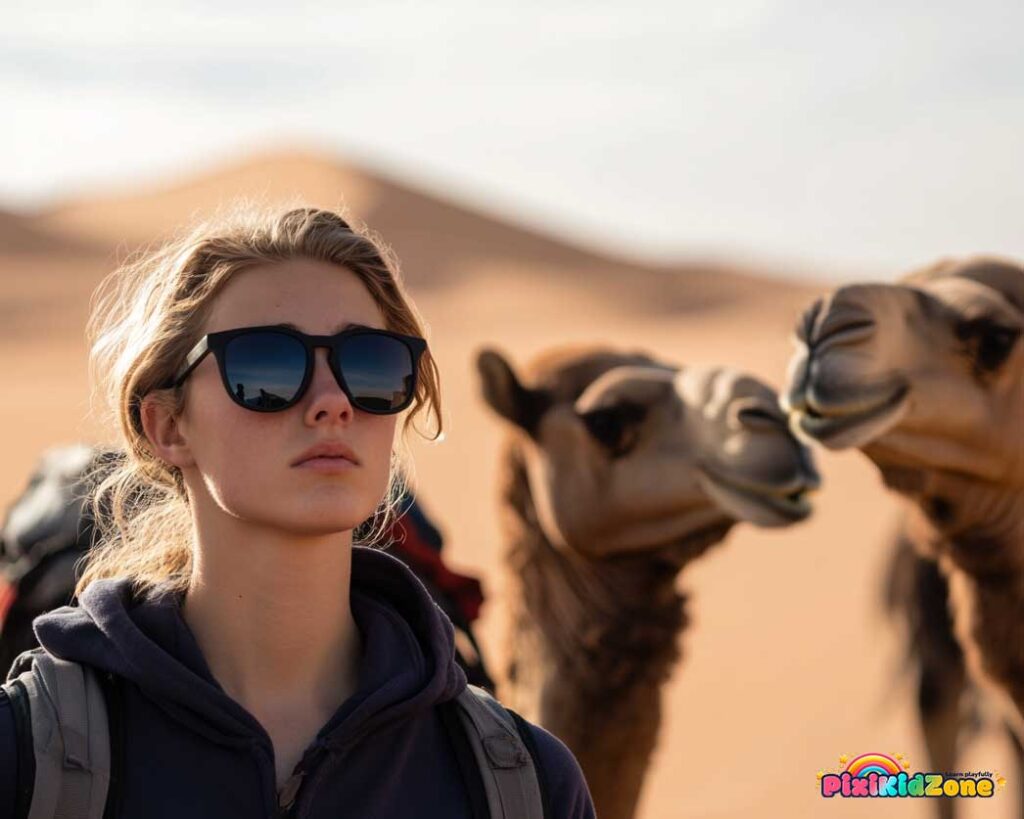
Don’t worry, you’re not alone with these questions! To avoid feeling lost and confidently interact with the locals – whether it’s a smiling tour guide or a camel handler – it’s worth learning a few essential Egyptian Arabic words and phrases. Let’s dive in and help you navigate the shadow of the pyramids and, of course, find the bathroom! 😊
1. Fayn al-piramidat?
(فين البيراميدات؟)
– Where are the pyramids?
(Essential for finding your way to these ancient wonders.)
2. Kam taman al-tazkara?
(كم تمن التذكرة؟)
– How much is the ticket?
(Perfect for asking about ticket prices.)
3. Ayez atakhod sora.
(عايز أتخذ صورة.)
– I’d like to take a photo.
If a man says it:
If a woman says it: Ayza atakhod sora. (عايزة أتخذ صورة.)
4. Mumkin tesawarni?
(ممكن تصورني؟)
– Can you take a picture of me?
(For those solo travel moments when you need a hand with your camera.)
5. Ezzay arooh al-hammam?
(إزاي أروح الحمام؟)
– How do I get to the bathroom?
(Because some things just can’t wait!)
6. Fayn maktab al-irshadat?
(فين مكتب الإرشادات؟)
– Where is the information desk?
(To ask for general guidance or directions.)
7. Ana da’i’.
(أنا ضايع.)
– I’m lost.
If a man says it:
If a woman says it: Ana da’i’a. (أنا ضايعة.)
8. Mumkin ashtari mayya?
(ممكن أشتري مية؟)
– Can I buy water?
(Useful to stay hydrated in the heat.)
9. Ayez aghod estiraha.
(عايز أخد استراحة.)
– I’d like to take a break.
If a man says it:
If a woman says it: Ayza aghod estiraha. (عايزة أخد استراحة.)
10. Ma’ andak kharita?
(مع عندك خريطة؟)
– Do you have a map?
(Helpful for navigating large sites like the Giza plateau.)
Closing Thoughts on Egyptian Arabic – A Guide for Language Enthusiasts and Travelers
The Egyptian Arabic language offers a unique window into a fascinating culture, whether you’re traveling or simply passionate about learning a new language. You don’t need to speak it perfectly to gain valuable experiences – even a simple “Salam!” or “Shukran!” can bring you closer to people, whether it’s bustling bazaar vendors, café patrons, or tour guides at the pyramids.
For language learners, consider this list as your entry point into a vibrant, living language filled with emotion, tradition, and unique expressions. Egyptian Arabic not only enriches your linguistic knowledge but also expands your cultural horizons. Don’t be afraid to put your new phrases into practice, as every word you speak is a step closer to understanding and connection. 😊

 English
English



 简体中文
简体中文 Español
Español Deutsch
Deutsch Português
Português Magyar
Magyar Русский
Русский Français
Français हिन्दी
हिन्दी العربية
العربية











